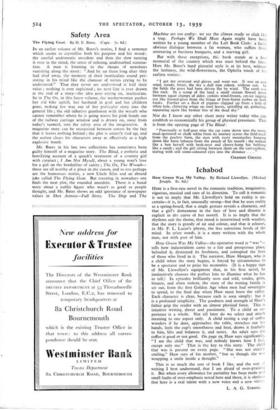Iehabod
How Green Was My Valley. By Richard Llewellyn. (Michael Joseph. 8s. 6d.) How Green Was My Valley. By Richard Llewellyn. (Michael Joseph. 8s. 6d.) HERE is a first-rate novel in the romantic tradition, imaginative, vigorous, musical and sure of its direction. To call it romantic is not to imply that Mr. Llewellyn's hold on reality is un- certain—it is, in fact, unusually strong—but that he uses reality as a spring-board, that a single gesture reveals a character, and that a girl's demeanour in the face of love and disaster is explicit in the curve of her nostril. It is to imply that the rhythms suit the theme, that mood is intertwined with weather, that the story is greedy of air and colour, and that it releases, in Mr. F. L. Lucas's phrase, the less conscious levels of the mind. In other words, it is a story written with the whole man, not with part of him.
How Green Was My Valley—the operative word is " was "- tells how industrialism came to a fair and prosperous place, befouled it, destroyed its freshness, and corrupted the lives of those who lived in it. The narrator, Huw Morgan, who is a child when the story begins, is forced by circumstance to be a spectator and to prize his memories. (It is a happy sign of Mr. Llewellyn's equipment that, in his first novel, he instinctively chooses the perfect lens to illumine what he has to tell.) In episodes brilliantly seen and told, tender, grim, bizarre, and often violent, the story of the mining family is set out, from the first Golden Age when men had sovereigns to spend, to the final day when Huw must leave the valley. Each character is clear, because each is seen simply : but it is a profound simplicity. The goodness and strength of Huw's father grip the reader with an almost physical force. This is intuitive writing, direct and passionate. To a child an ex- perience is a whole. Not till later do we select and attach meaning to one aspect only. A child tasting a cup of coffee wonders if he dare, approaches the table, stretches out his hands, feels the cup's smoothness and heat, draws it fearfully to him, lifts and balances it, and tastes. An adult says the coffee is good or not good. On page 19, Huw says significantly, " I am the child that was, and nobody knows how I feel, except only me." That is the key to this story. The child that was is present on every page. " She was not exactly smiling," Huw says of his mother, " but as though she w is wrapping a smile inside a thought."
This is so much the sort of book I like, and the sort of writing I best understand, that I am afraid of over-praising it. But when every allowance for partiality has been made and small faults of over-emphasis noted here and there, it is obvious that here is a real talent with a new voice and a new vision.
L. A. G. STRONG.










































 Previous page
Previous page